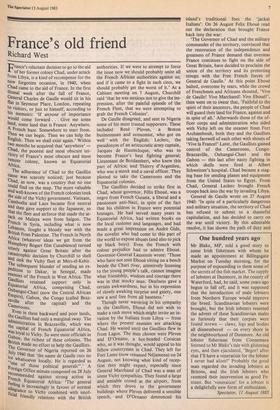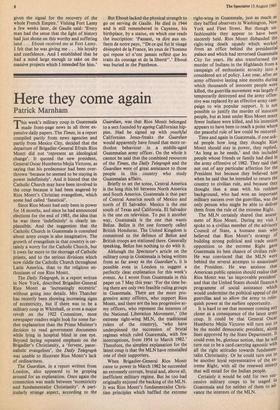France's old friend
Richard West
France's reluctant decision to go to the aid of her former colony Chad, under attack from Libya, is a kind of recompense for the now forgotten occasion, in 1940, when Chad came to the aid of France. In the first dismal week after the fall of France, General Charles de Gaulle would sit in his flat in Seymour Place, London, repeating to visitors, or just to himself, according to his memoirs: 'If anyone of importance would come forward . . . Give me some land, some land that is France. Anywhere. A French be Somewhere to start from. Then we can begin. Then we can help the English. Then we shall exist again.' Within two months he acquired that 'anywhere' Chad, the poorest and most obscure ter- ritory of France's most obscure and most remote colony, known as Equatorial Africa.
The adherence of Chad to the Gaullist cause was scarcely noticed; just because Chad, as now, was a country that no one Could find on the map. The more valuable and well-known of the French colonies took the side of the Vichy government. Vietnam, Cambodia and Laos became first neutral and then gave support to the Japanese, so that the fleet and airforce that made the at- tack on Malaya were from Saigon. The French in Syria, including what is now Lebanon, fought a bloody war with the British from Palestine. The French in North Africa (whatever ideas we get from the Humphrey Bogart film Casablanca) turned utterly against Great Britain after the catastrophic decision by Churchill to shell and sink the Vichy fleet at Mers-el-Kebir. The subsequent blunder of sending an ex- pedition to Dakar, in Senegal, made enemies of the French in West Africa. The Gaullists retained support only in Equatorial Africa, comprising Chad, Oubangui-Chart (now the Central African Empire), Gabon, the Congo (called Braz- 4aville after the capital) and the earneroons. Even in these backward and poor lands, the Gaullists had only a marginal sway. The administration in Brazzaville, which was the capital of French Equatorial Africa, was loyal to Vichy. So were most officials in o abon, the richest of these colonies. The British made no effort to help the Gaullists. The Governor of Nigeria reported on 26 nlY 1940 that 'the name de Gaulle cuts no 1,e,e whatsoever locally. He is regarded as one of those political generals".' A Foreign Office minute composed on 28 July rIpecortunended against strong action in rench Equatorial Africa: 'The general `e,eling is increasingly in favour of normal a,fiegiance to Vichy combined with unof- "eial friendly relations with the British
authorities. If we were to attempt to force the issue now we should probably unite all the French African authorities against us; and if it came to a fight in such circs, we should probably get the worst of it.' At a Cabinet meeting on 7 August, Churchill said 'that he was anxious not to give the im- pression, after the painful episode of the French Fleet, that we were attempting to grab the French Colonies'.
De Gaulle disagreed, and sent to Nigeria some of his most trusted supporters. These included Rene Pleven, a Breton businessman and economist, who got on well ' with the English; Leclerc, the pseudonym of an aristocratic army captain, Jacques de Hautecloque, who was to become France's best fighting general; Lieutenant de Boislambert, who knew this part of Africa; and Thierry d'Argenlieu, who was a monk and a naval officer. They plotted to take the Cameroons and the Equatorial colonies.
The Gaullists decided to strike first in Chad, whose governor, Felix Eboue, was a negro from French Guiana, a liberal and a passionate anti-Nazi, in spite of the fact that his children in France were potential hostages. He had served many years in Equatorial Africa, had written books on the local customs and languages, and had made a great impression on Andre Gide, the novelist who had come to this part of the world to expose abuses (and also to pick up black boys). Even the French with colour prejudice had to admire Eboue. Governor-General Laurentie wrote: 'Those who have not seen Eboue sitting on a bench beside the Chari river, attentively listening to the young people's talk, cannot imagine what friendship, wisdom and courage there was in that stocky man. Deafness gave a certain awkwardness, but in his expression of slowly awaking surprise and gaiety, one saw a soul free from all baseness.'
Though never wavering in his sympathy to the Gaullists, Eboue did not wish to make a rash move which might invite an in- vasion by the Italians from Libya — from where the present enemies are attacking Chad. He waited until the Gaullists flew in from Lagos. The men chosen were Pleven and D'Ornano, a hot-headed Corsican who, so it was thought, would appeal to his fellow countrymen in Chad. They left for Fort Lamy (now renamed Ndjamena) on 24 August, not knowing what kind of recep- tion they might expect, especially since General Marchand of Chad was a man of some Vichy sympathies. They found a large and amiable crowd at the airport, from which they drove to the government buildings where Pleven delivered a sensible speech, and D'Ornano denounced his
island's traditional foes the 'jackal Italians'. On 26 August Felix Eboue read out the declaration that brought France back into the war: 'The Governor of Chad and the military commander of the territory, convinced that the restoration of the independence and greatness of France demand that overseas France continues to fight on the side of Great Britain, have decided to proclaim the union of the territory and its protecting troops with the Free French forces of General de Gaulle.' At this point Eboue halted, overcome by tears, while the crowd of Frenchmen and Africans shouted, 'Vive de Gaulle! Vive Marchand! Vive Ebouel', then went on to swear that, 'Faithful to the spirit of their ancestors, the people of Chad will guard their land for France, against and in spite of all.' Afterwards those of the of- ficer corps and administration who sided with Vichy left on the steamer from Fort Archamboult, both they and the Gaullists taking farewell of each other with shouts of `Vive la France!' Later, the Gaullists gained control of the Cameroons, Congo- Brazzaville, Oubangui-Chari and the Gabon — this last after nasty fighting in which shells were fired at Albert Schweitzer's hospital. Chad became a stag- ing base for sending planes and equipment from the United States to Egypt. From Chad, General Leclerc brought French troops back into the war by invading Libya.
General de Gaulle wrote on 27 August 1940: `In spite of a particularly dangerous and military situation, the territory of Chad has refused to submit to a shameful capitulation, and has decided to carry on the war until victory. By this admirable resolve, it has shown the path of duty and
given the signal for the recovery of the whole French Empire.' Visiting Fort Lamy a few weeks later, de Gaulle said: 'Every man had the sense that the light of history had just shone on this worthy and suffering land ... Eboue received me at Fort Lamy. I felt that he was giving me . . . his loyalty and confidence. And I established that he had a mind large enough to take on the massive projects which I intended'for him.'
But Eboue lacked the physical strength to go on serving de Gaulle. He died in 1944 and is still remembered in Cayenne, his birthplace, by a statue, on which one reads the inscription: 'Passant, va dire aux en- fants de notre pays, "De ce qui fut le visage deiespere de la France, les yeux de l'homme qui repose ici n'ont jamais reflete que les traits du courage et de la liberte".' Ebout was buried in the Pantheon.







































 Previous page
Previous page